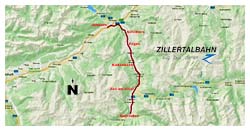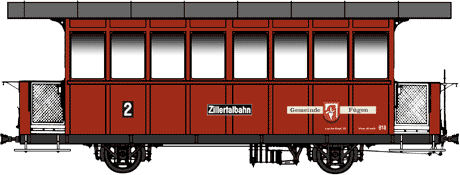
and is about to pass beneath the Inntal Autobahn - 11 Jun 2017 William Slim.
Zillertalbahn
Jenbach Austria
N47.387685 E11.777606
 The Zillertalbahn (ZB) is a 760 millimeter (about 2 1/2 feet, or 30 inches) narrow gauge railway that lies south of Jenbach, Austria, in the area known as the Tyrol. Jenbach is also a terminal for standard gauge ÖBB trains and the metre gauge Achenseebahn rack railway. The Zillertalbahn is 32 kilometres in length laid along the broad Ziller valley to reach Mayrhofen where the valley peters out as it starts to butt up against the Italian Alps. The line is primarily a commuter line with service every half hour for local people living in the villages along the route. It is best known by railfans and tourists because of the steam locomotive powered excursion trains utilizing a number of heritage coaches.
The Zillertalbahn (ZB) is a 760 millimeter (about 2 1/2 feet, or 30 inches) narrow gauge railway that lies south of Jenbach, Austria, in the area known as the Tyrol. Jenbach is also a terminal for standard gauge ÖBB trains and the metre gauge Achenseebahn rack railway. The Zillertalbahn is 32 kilometres in length laid along the broad Ziller valley to reach Mayrhofen where the valley peters out as it starts to butt up against the Italian Alps. The line is primarily a commuter line with service every half hour for local people living in the villages along the route. It is best known by railfans and tourists because of the steam locomotive powered excursion trains utilizing a number of heritage coaches.
The Zillertalbahn was founded in 1899 with headquarters in Jenbach which lies on the ÖBB's mainline running east-west along the Inn Valley. The Zillertalbahn opened on 31 Jul 1902 to provide a connection for the Ziller Valley villagers to Jenbach and the standard gauge mainline located there.
In 1956 the present day company name, Zillertaler Verkehrsbetriebe AG, (Zillertaler Transport Company) was adopted when the company absorbed a local bus operation that had been founded in 1935. Hence the names seen on their logo, zug, bus, and dampf (train, bus, and steam).
In 1965 the line was extended by 2.5 kilometres to bring materials and equipment to a power station. This extension line has subsequently been removed. However at that time two diesel locomotives and some transporter wagons were acquired and the Zillertalbahn became the first railway in Austria to use "Zugfunk" (train radio), for the control of trains.
In 1976 extraction of magnesium ore from Tux came to an end. This traffic had been an important source of income for the line since 1928.
Since 2005 the siding switches on the line have been remotely controlled from the Jenbach control centre using fibre optic transmission cables - Wikipedia.
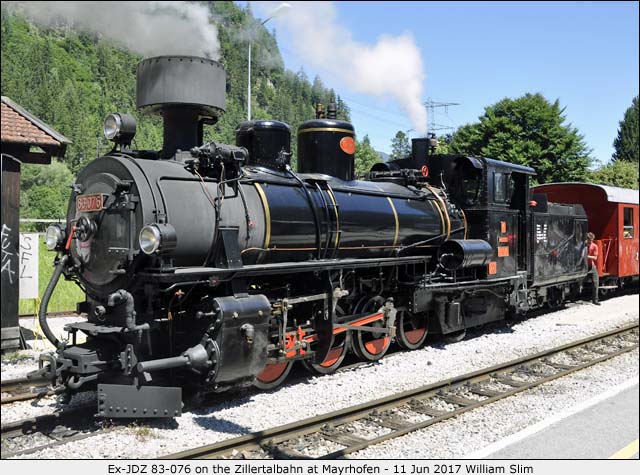
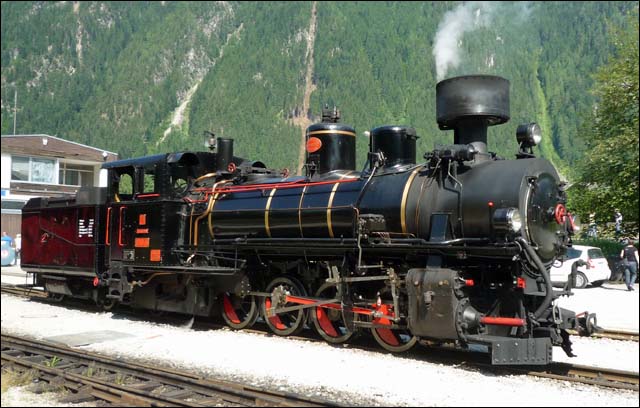
Zillertalbahn 0-8-2 steam locomotive number 4 is the former Yugoslavian State Railway (JDZ) number 83-076. In 1878, Austria-Hungary occupied the Ottoman (Turkish) countries of Bosnia and Herzegovina and incorporated them into the then dual monarchy as regions with special status. Shortly thereafter, railway construction began with the then exotic gauge of 760 milimetres which is still known as the Bosnian gauge. The Bosnian-Herzegovinian State Railways operated a growing, mostly difficult network with 760 mm narrow gauge engines. The following state of Yugoslavia extensively expanded the network and connected Bosnia and Herzegovina with the Serbian routes. Approximately 182 locomotives of the 83 type were built between 1903 and 1949 by various manufacturers in Yugoslavia and Germany. Club 760 acquired the engine in 1987 and leased it to the Zillertalbahn in 1993 who financed the general restoration to operating condition at Reichsbahnausbesserungswerk Meiningen or RAW Meiningen in Germany. Since 1994 it has been known as the Dampflokwerk Meiningen (Meiningen Steam Locomotive Works).
Number: 83-076
Wheel arrangement: 0-8-2
Gauge: 760 mm (29.9 in.)
Builder: Krauss/Linz
Built: 1909
Fuel: Coal
Boiler pressure: 12 bar (176 psi)
Drive wheel dia: 900 mm (35.4 in.)
Maximum speed: 35 kph (21.8 mph)
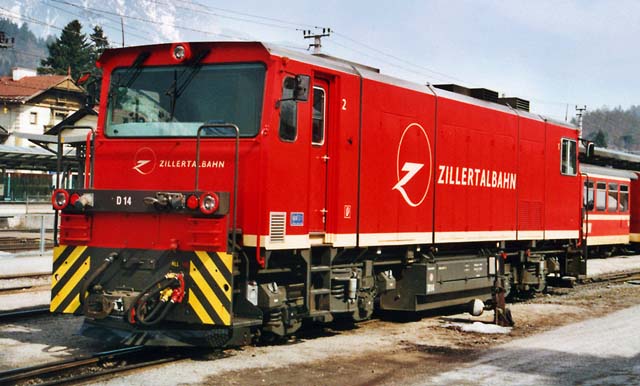
ZVB number D14 is a diesel-hydraulic locomotive model D75 BB-SE built by Gmeinder Lokomotivenfabrik GmbH in 2007. Model D75 BB-SE diesel locomotives were developed specially for the Zillertalbahn with delivery beginning in 2004. Two additional locomotives are in service with the SLB Pinzgauer Lokalbahn bearing numbers Vs81 and Vs82. The locomotive is used to pull passenger and goods trains as well as for shunting work. It is equipped with two cabs as well as push-pull controls. If required they can be fitted with metre gauge or standard gauge trucks. The locomotives have a power output of 746 kilowatts (1,040 hp). The permissible maximum speed is 80 kph. For shunting work the locomotives are fitted with a remote control unit.
This schematic diagram shows the layout of internal components within the locomotive. The locomotive side, top, and end elevations are shown in this D75 BB-SE drawing.
Gemeinder & Company GmbH based in Mosbach, Germany, emerged from the Badische Motor-Lokomotiv-Werke which was established in 1925. It manufactured narrow gauge track systems, standard gauge locomotives, and mining equipment as well as pinions and rack systems. After 1945 further shunting locomotives were produced and specifically delivered to the Deutsche Bundesbahn (DB). These were supplemented by narrow gauge diesel-hydraulic locomotives as well as diesel-electric locomotives. In 1976 Gmeinder merged with Kaelble (Backnang) to form Kaelble-Gmeinder GmbH. After the company went bankrupt in 1996 the Gmeinder part was sold to form the Gmeinder Lokomotiven und Maschinenfabrik GmbH. At the end of 2003 the locomotive construction division was sold to an investor and has traded under the name Gmeinder Lokomotivenfabrik GmbH. Diesel locomotives continue to be manufactured and maintained in Mosbach.












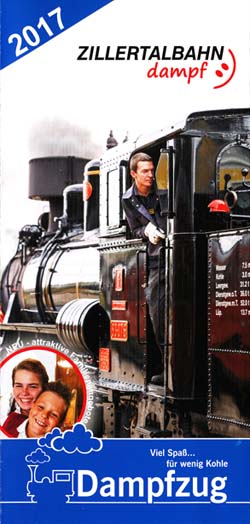
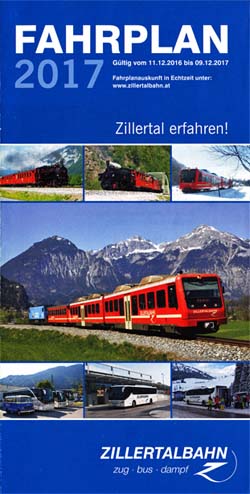
The Zillertalbahn steam train 2018 timetable is available here.

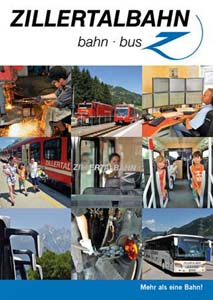


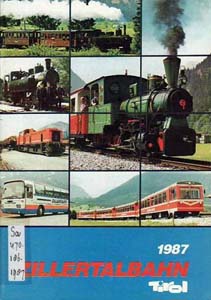
4 Feb 2015 - Historic Zillertalbahn Buffet Wagen
14 Jul 2017 - Zillertalbahn Continues on its Road to Success
30 Jul 2017 - Teenager Spray Paints Trainsets
29 Aug 2017 - Zillertalbahn Blown Away in Court
11 Sep 2017 - 54-Year-Old Injured in Schlitters
28 Sep 2017 - Accident on the Zillertalbahn
6 Oct 2017 - Delivery Truck Flies Over Track
9 Nov 2017 - Dampfzug Season 2018
2 Feb 2018 - Zillertalbahn Goes With Hydrogen
Dampflokwerk Meiningen (Link fails 1 May 2023)
Betriebswerk der Ziellertalbahn Photos
Railfan Europe Picture Gallery
Schmalspurbahnen in Österreich
Liliput Zillertalbahn 0-6-2T U Class Locomotive Model
LGB Zillertalbahn 0-6-2T U Class Locomotive Model
 Die ZillertalbahnFranz Kleindel.1978Verlag Pospischild.Hardcover95 pages, b&w illustrations, Used €79.89Language German.
Die ZillertalbahnFranz Kleindel.1978Verlag Pospischild.Hardcover95 pages, b&w illustrations, Used €79.89Language German. 70 Jahre ZillertalbahnUwe-Jens Jansen.1970Zillertaler Verkehrsbetriebe A.G.Paperback36 pages, 18 x 24 cm, used €7.50Language German.
70 Jahre ZillertalbahnUwe-Jens Jansen.1970Zillertaler Verkehrsbetriebe A.G.Paperback36 pages, 18 x 24 cm, used €7.50Language German.




